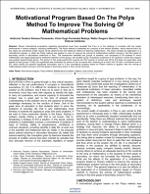| dc.contributor.author | Esteves Pairazamán, Ambrocio Teodoro | |
| dc.contributor.author | Fernández Bedoya, Víctor Hugo | |
| dc.contributor.author | Ibarra Fretell, Walter Gregorio | |
| dc.contributor.author | Esteves Cárdenas, Veronica Liset | |
| dc.date.accessioned | 2022-01-19T14:42:45Z | |
| dc.date.available | 2022-01-19T14:42:45Z | |
| dc.date.issued | 2019-11 | |
| dc.identifier.issn | 22778616 | |
| dc.identifier.uri | https://hdl.handle.net/20.500.13067/1568 | |
| dc.description.abstract | Recent international evaluations regarding educational level have revealed that Peru is in the rankings of countries with the lowest performance in various subjects, including mathematics. The Polya method is presented as a solution to this serious situation, which assures that if its four steps are considered, better results will be obtained than the traditional method of teaching mathematics. This study narrates the application of a motivational program, in which the Polya method was applied in order to improve the solving of mathematical problem solving in the third grade of secondary school in educational institutions in Peru. The researchers identified two groups of students, one composed of 39 students in which mathematics was taught applying the traditional method (control group), and another group of students composed of 41 students in which this program was applied (experimental group). The period of this quasi-experiment covered the third quarter of school year 2019. Pre-tests and post-tests were applied to both groups. Finally, the hypothesis was contrasted by means of the chi-square test, obtaining as a result 182.142 with a confidence level of 5%, which affirms the general hypothesis formulated, that is: if the motivational program based on Polya's method is applied, then the solving of mathematical problem solving in the third grade of secondary school in Peru will be improved. | es_PE |
| dc.format | application/pdf | es_PE |
| dc.language.iso | eng | es_PE |
| dc.publisher | International Journal of Scientific and Technology Research | es_PE |
| dc.rights | info:eu-repo/semantics/openAccess | es_PE |
| dc.rights.uri | https://creativecommons.org/licenses/by-nc-nd/4.0/ | es_PE |
| dc.source | AUTONOMA | es_PE |
| dc.subject | Algebra | es_PE |
| dc.subject | Education | es_PE |
| dc.subject | High school | es_PE |
| dc.subject | Mathematical problems | es_PE |
| dc.subject | Motivational program | es_PE |
| dc.subject | Polya method | es_PE |
| dc.title | Motivational Program Based On The Polya Method To Improve The Solving Of Mathematical Problems | es_PE |
| dc.title.alternative | Programa motivacional basado en el método polya para mejorar la resolución de problemas matemáticos | es_PE |
| dc.type | info:eu-repo/semantics/article | es_PE |
| dc.identifier.journal | International Journal of Scientific and Technology Research | es_PE |
| dc.subject.ocde | https://purl.org/pe-repo/ocde/ford#2.02.04 | es_PE |
| dc.publisher.country | PE | es_PE |
| dc.relation.url | https://www.scopus.com/inward/record.uri?eid=2-s2.0-85075064841&partnerID=40&md5=ef9768d40ba3f226f674838d8f95787a | es_PE |
| dc.source.volume | 8 | es_PE |
| dc.source.issue | 11 | es_PE |
| dc.source.beginpage | 626 | es_PE |
| dc.source.endpage | 630 | es_PE |


